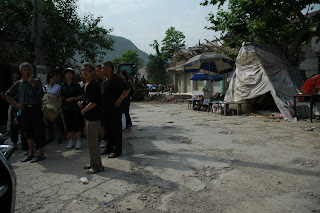Sichuan Trip: Day Two
We arrived at the Heart to Heart International Distribution Center at 7:30 AM ready to head out. There was certainly no shortage of volunteers. Some came from the local area, others from other countries. Everyone seemed eager to help. Organizing the teams and arranging transportation was a huge job. The H2H folks had been working all week from morning till night and were short on sleep; nevertheless, they were very patient and helpful.
Here is our group from the first day, minus the four added after the photo was taken. Gabe (front row, center), Josh (front row, second from right), and Doug (back row, third from left) were featured on ABC Nightly News for the work they did in a displaced persons camp the day after we traveled with them.

We filled out paperwork (including waivers, in case something unforeseen was to happen to us!), took group pictures, plotted our destination, and loaded up supplies before finally departing around 9:30 AM. By the time we left, our original group of five had swelled to more than ten! Our entourage included four vehicles!!
A large coloseum located in Mianyang City where approximately 10,000 displaced persons were living.



While attempting to go beyond the village, we bumped into a Chinese Red Cross group coming down the mountain road who informed us that the villages beyond were already supplied. This was a common theme of our trip. Each place we went, with the exception of two, we saw evidence that military or Red Cross vehicles had already been there distributing supplies to the quake victims.
Photo taken while entering the first village we visited.

The second village we visited was about an hour northwest of the first village. To get there we went through a mountain pass where we saw evidence of landslides. The leader of the village informed us that up their mountain dirt road were nine villages but only the first two were able to be reached. He assured us that those who needed care had received it, but that they could use some food, water, and tarps. The people were in good spirits and we played with some of the children.
En route to the second village. In the background is a bulldozer. We saw much heavy machinery during our time there that was being used at this point to clear debris.

The final village we visited was within 2 kilometers of the third village. These folks were also eager to talk. The doctors treated some minor injuries and again surveyed the damage, which was devastating. Unfortunately, it was here we made our first mistake. Rather than consulting with the village leader to head up the distribution of supplies (decide who needed what), we went ahead and unloaded all the supplies on the ground at once. This created a situation that was emotionally charged and was embarrassing both for the villagers and the volunteers. The leader promptly asked us to leave after the incident.
One of our doctors treating a villager.




<< Home